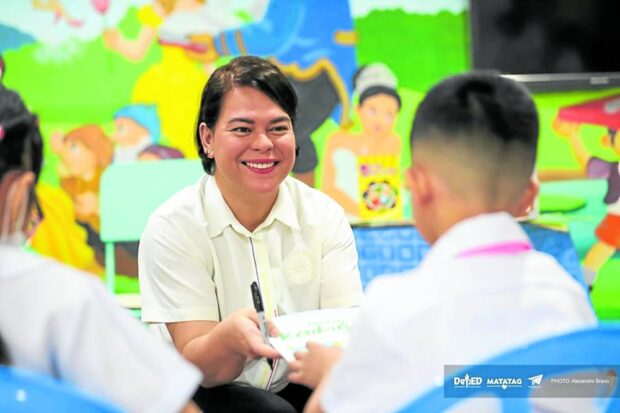DepEd to introduce reading program to boost literacy

MEET THE AUTHOR | Vice President Sara Duterte, who also heads the Department of Education, presents to pupils of the Esteban Abada Elementary School in Quezon City her children’s book “Ang Kaibigan” on Tuesday, Nov. 21, 2023. (Photo from the Department of Education)
MANILA, Philippines — Starting Jan. 12, 2024, the Department of Education (DepEd) will implement a reading program in all public schools as part of its initiatives to improve the literacy skills of elementary and high school students.
“All learners from Kinder to Grade 12 shall use the time to read books, articles, and other reading materials based on their interest,” Vice President and Education Secretary Sara Duterte said on Tuesday, adding that they would also be asked to write books, essays, book reviews, and analyses, among others.
In a chance interview at Esteban Abada Elementary School in Quezon City during a program for National Reading Month, she told reporters the specific guidelines for the program called “Catch-up Fridays” would be released next month.
According to Duterte, the DepEd curriculum and teaching office would “find a way” to fit all the regular lessons throughout Mondays to Thursdays so that Fridays could be devoted solely to reading, in addition to health, values, and “peace education.”
The last subject, a new feature of the revised K-10 curriculum, “holds a very special place in my heart,” she said earlier.
Students who are already literate will be taught critical thinking and analysis skills. If they are equipped with these skills as well, they will be instructed to “write a book [or an] essay” instead, she said.
Children’s book
At the event, Duterte also launched a children’s book she wrote titled, “Ang Kaibigan (The Friend),” a short story about a kind and compassionate parrot who helps an owl rebuild her nest after a typhoon.
“She lost all her friends but there was one who came back and helped her. That’s the lesson in the book, about friendship and kindness,” she said, adding that her first book was inspired by the Filipino youth.
Duterte read the book to 10 Grade 3 and 4 students of the school who each received a signed copy.
Catch-up Fridays, part of DepEd’s learning recovery program, stemmed from Duterte’s directive to innovate the agency’s approach to addressing learning losses.
According to a World Bank (WB) report in 2022, nine out of 10 or 91 percent of Filipino children were still struggling to read simple texts by age 10 or the late primary age.
This made the Philippines one of the countries with the highest rates of “learning poverty” in the East Asia and Pacific region and among lower-middle-income economies, the Washington-based lender said in a brief dated June 2022.
‘Not really good’
The WB defined learning poverty as being unable to read and understand short age-appropriate texts by the age of 10, or between Grades 4 and 5 under the country’s K–12 educational system.
The United Nations Children’s Fund also said in an April 2022 report that 85 percent of Filipino schoolchildren were struggling with reading simple texts. The long school closures caused by the COVID-19 pandemic in the country were a contributing factor, it pointed out.
In the 2018 Program for International Student Assessment (Pisa) conducted by the Organization for Economic Cooperation and Development, Filipino students aged 15 scored the lowest in reading comprehension with an average score of 340 points, way below the survey average of 487 points.
With the Pisa 2022 results coming out in two weeks, Duterte reiterated that DepEd was not expecting good results, saying, “We’ve already had two Pisa results but our efforts did not show good scores in the assessment of the kids.”
“Let’s see if we can observe changes after we do [Catch-up Fridays],” she said, adding that the program would run until 2028, or until the end of her term.
“We are seeing that the quality of education is not really good and we are going to start with teaching students how to read. There are a lot of nonreaders and slow readers so we need to give them one day where they will do nothing but practice and learn how to read,” Duterte said.